
Mohammed Yusuf Khan, better known by his stage name Dilip Kumar, was an Indian actor and film producer who worked in Hindi cinema. Referred to as the "Tragedy King" for his portrayal of serious roles and retrospectively as "The First Khan" of Bollywood, he has been described as one of the most successful film stars in the industry and is credited with bringing a distinct form of method acting to cinema. Kumar holds the record for most wins for the Filmfare Award for Best Actor and was also the inaugural recipient of the award, he has won 3 Filmfare awards consecutively.

Saira Banu is an Indian actress who mainly works in Hindi language films. She is one of the most popular actresses in Indian film history.
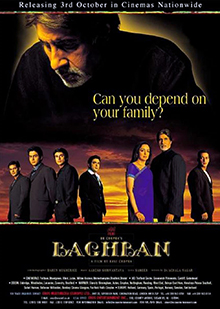
Baghban (transl. Gardener) is a 2003 Indian Hindi-language drama film directed by Ravi Chopra. It tells the story of an elderly couple, Raj and Pooja, who have been married for 40 years. After Raj retires, they reunite with their four sons to discuss who will support them. None of the sons want to take care of both parents, causing Raj and Pooja to live separately.

Naseeruddin Shah is an Indian actor. He is notable in Indian parallel cinema. He has also starred in international productions. He has won numerous awards in his career, including three National Film Awards, three Filmfare Awards and the Volpi Cup for Best Actor at the Venice Film Festival. The Government of India honoured him with the Padma Shri and the Padma Bhushan awards for his contributions to Indian cinema.
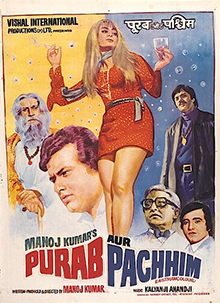
Purab Aur Pachhim is a 1970 Indian Hindi-language drama film. The movie was produced and directed by Manoj Kumar, and it stars Manoj Kumar, Saira Banu, Ashok Kumar, Pran and Prem Chopra in the lead roles. The music is by Kalyanji Anandji. The 2007 film Namastey London is inspired from this film. This was the second film by Manoj Kumar where he stars as Bharat and one of his four films on patriotism
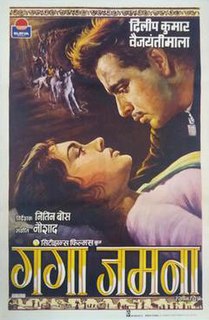
Ganga Jamna, also transliterated as Ganga Jamuna or Gunga Jumna, is a 1961 Indian crime drama film, written and produced by Dilip Kumar, and directed by Nitin Bose, with dialogues written by Wajahat Mirza; Kumar later said that he also ghost-directed and edited the film. It stars Dilip Kumar with Vyjayanthimala and his real-life brother Nasir Khan in the leading roles. Set in the rural Awadh region of Northern India, the film tells the story of two impoverished brothers, Ganga and Jamna, and their poignancy and sibling rivalry on opposing sides of the law, one a dacoit criminal and the other a police officer. The film was also notable for its Technicolor production, use of the Awadhi dialect, and its rustic setting, being a defining example of the dacoit film genre. It was ranked 11th in Outlook Magazine's poll considering 25 leading Indian directors' for Bollywood's greatest films in 2003.

Bairaag (transl. Detached) is a 1976 Hindi-language film. Produced by the duo Mushir-Riaz, it is directed by Asit Sen. The film stars Dilip Kumar, who received a Filmfare nomination for Best Actor for playing a triple role. Bairaag also stars Saira Banu, Leena Chandavarkar, Ruma Guha Thakurta, Prem Chopra, Helen, Sujit Kumar, Madan Puri, Paintal, Kader Khan, Asit Sen and Sachin. Its music is by the duo Kalyanji Anandji, who received a Filmfare nomination for Best Music. The film received a Filmfare Award for Best Sound for P. Harikishan. The film failed to perform at the box office. It was Dilip Kumar's third consecutive failure at box-office, the first and only time in his career since Milan (1946). After this film, he went on an indefinite hiatus and returned after 5 years in Kranti (1981).

Sagina is a 1974 Hindi film, produced by J. K. Kapur and directed by Tapan Sinha, the film stars Dilip Kumar, Saira Banu, Aparna Sen, Om Prakash. It was a remake of 1970 Bengali movie Sagina Mahato directed by Tapan Sinha with the same lead pair in the cast. This version was a commercial failure, and Dilip Kumar's first consecutive failure in almost three decades since 1945. His last film Dastaan (1972) was also a commercial failure.
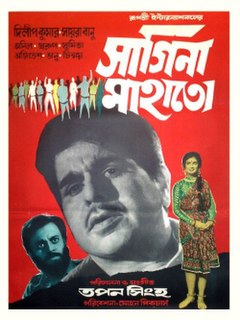
Sagina Mahato is a 1970 Bengali film. Produced by Shri J. K. Kapur and directed by Tapan Sinha, the film stars Dilip Kumar and Saira Banu. The film is based on the true story of the labour movement of 1942–43, told through with fictional characters, and the mock trial of Sagina Mahato, the trade union leader of a factory in Siliguri. It was entered into the 7th Moscow International Film Festival. The film was shot on locations in Kurseong, near Darjeeling. The film was remade as a Hindi film titled Sagina in 1974, by Sinha with the same leads, produced by the same producers team J.K. Kapur and Hemen Ganguly, though this version wasn't successful. Film music composed by legendary playback singer Anup Ghoshal
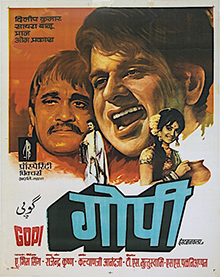
Gopi is a 1970 Hindi film produced by T. S. Muthuswami and S. S. Palaniappan, the film is directed by A. Bhimsingh. It stars Dilip Kumar, Saira Banu, Pran, Om Prakash, Nirupa Roy, Farida Jalal, Johnny Walker, Mukri, Durga Khote, Lalita Pawar in pivotal roles.

Syed Wajid Hussain Rizvi, better known by his film screen name, Agha Jani Kashmiri, was an Indian screenwriter, former actor and Urdu poet.
J. K. Kapur was an Indian filmmaker, producer, social activist, and restaurateur.
Kise Apna Kahein is an Indian television series that aired on Sahara Manoranjan. The series premiered on 26 May 2003 and is produced by Saira Banu and Dilip Kumar's production house Sharp Focus Productions.

Pyar Mohabbat is a 1966 Indian Bollywood film produced and directed by Shankar Mukherjee. It stars Dev Anand and Saira Banu in pivotal roles.

House of Dilip Kumar, Peshawar housed the Indian film actor Dilip Kumar. Born as Mohammad Yusuf Khan in Peshawar on 11 December 1922, one of twelve siblings, he moved to Bombay in the late 1930s with his family.
Udaya Tara Nayar is a film journalist in India.

Naseem Banu was an Indian actress. She was referred to as Naseem and known as "Beauty Queen" and the "first female superstar" of Indian Cinema. Starting her acting career in the mid-1930s she continued to act till mid-1950s. Her first film was Khoon Ka Khoon (Hamlet) (1935) with Sohrab Modi under whose Minerva Movietone banner she acted for several years. Her high-point came with Modi's Pukar (1939) in which she played the role of Empress Nur Jahan. According to composer Naushad she got the sobriquet Pari-Chehra Naseem through the publicity advertisements of her films. She was the mother of actress Saira Banu and mother-in-law to the actor Dilip Kumar.
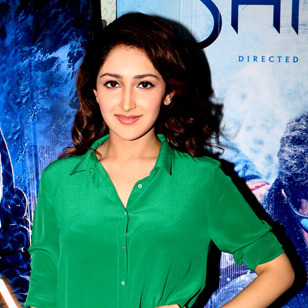
Sayyeshaa Saigal, known mononymously as Sayyeshaa, is an Indian actress and dancer who primarily appears in Tamil-language films. After working in a Telugu film Akhil (2015), she made her Hindi debut in Ajay Devgn's Shivaay (2016), and her Tamil debut in the film Vanamagan (2017). She made her Kannada debut in the film Yuvarathnaa (2021).
Paari is a 1966 Bengali film directed by Jagganath Chatterjee, based on a story by Jarasandha. It stars Dharmendra in his first Bengali film and Pronoti Ghosh, with Dilip Kumar in a guest appearance as a jailor in Andaman and was successful. It was later remade in 1972 by the same director in Hindi as Anokha Milan with the lead actors reprising their roles. This was the first movie in which Dilip Kumar and Dharmendra appeared together.

Faisal Farooqui is an Indian technology entrepreneur and the founder and CEO of the review and rating platform MouthShut.com.
















